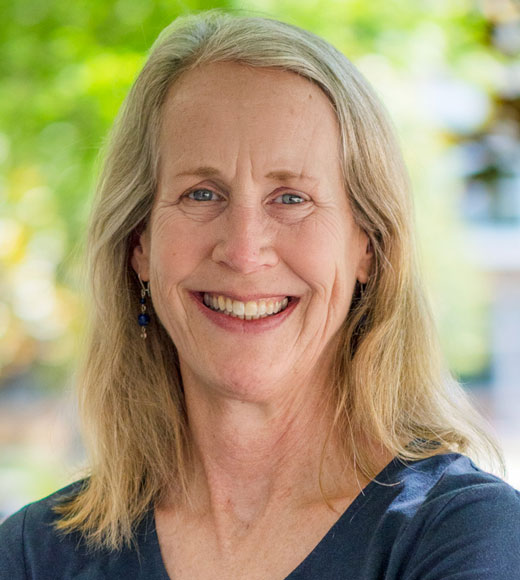Susan L. Handy, Ph.D.
- Director, National Center for Sustainable Transportation
- Co-Director, BicyclingPlus Research Collaborative
- Associate Director for Education, ITS-Davis
- Chair, TTP Graduate Group
- Professor, Environmental Science and Policy
- Relationships between transportation and land use
- The impact of land use on travel behavior
- Factors influencing bicycling as a mode of travel
- Strategies for reducing automobile dependence
Biography
Professor Susan Handy teaches in the Department of Environmental Science and Policy at the University of California at Davis. She has courses in the Environmental Policy and Planning major and in the Transportation Technology and Policy Program. Her research focuses on the relationships between transportation and land use, particularly the impact of land use on travel behavior, and on strategies for reducing automobile dependence. Her recent work includes a series of studies on bicycling in Davis, a study of the effects of the opening of the first “big box” store in Davis, the development of a method for estimating vehicle trip generation for “smart growth” development projects in California, and an assessment of the available evidence on the effects of land use and transportation strategies on reducing vehicle travel and greenhouse gas emissions She serves on the Committee on Women’s Transportation Issues and the Committee on Transportation Education of the Transportation Research Board.
2011-Present Member of Executive Board for World Society on Transportation & Land Use Research 2010 Member of Organizing Committee for the UTC Spotlight Conference on Livability 2008-Present Associate Editor for Transportation, Journal of the American Planning Association 2008-2009 Member of Institute of Medicine Committee on Childhood Obesity Prevention Actions for Local Governments 2007-2010 Member of Research and Technical Advisory Panel (RTAP) for the Business, Transportation, and Housing Agency of the State of California 2006-2007 Member of Jury of the Transbay Transit Center Design Competition 2006 Transportation Foundation’s Organization of the Year “TRANNY Award” for excellence in California 2005-Present Member of Committee on Women’s Issues in Transportation of the Transportation Research Board 2005-2006, 2007-2008 Member of Transportation Research Board Committee on Innovations in Travel Demand Modeling: A Conference 2004-2005 Member of National Research Council Committee on Research on Women’s Travel Issues Conference 2003-2007 Member of National Advisory Committee of the Active Living by Design Program of the Robert Wood Johnson Foundation 2003-2004 Member of Institute of Medicine Committee on the Prevention of Obesity in Children and Youth 2000-2006 Chair of Committee on Telecommunications and Travel Behavior of the Transportation Research Board 1995-2009 Member of Committee on Transportation and Land Development of the Transportation Research Board 1996-1998 Chair of Project H-12 for the Transit Cooperative Research Program of the Transportation Research Board 1994-2002 Member of Executive Committee of the Southwest Region University Transportation Center 1990-1992 Member of Association of Collegiate Schools of Planning Commission on the Doctorate in Planning
ESP 171 Urban and Regional Planning (4) Lecture—3 hours; discussion—1 hour; term paper. Prerequisite: course 1; a course in social science and a course in environmental science. How cities plan for growth in ways that minimize environmental harm. Standard city planning tools (general plan, zoning ordinance) and innovative new approaches. Focus on planning requirements and practices in California. Relationships between local, regional, state, and federal policy. GE credit: SS, WE.—III. (III.) Handy ESP 178 Applied Research Methods (4) Lecture—3 hours; discussion—1 hour. Prerequisite: Statistics 103 or Sociology 106 or the equivalent. Research methods for analysis of urban and regional land use, transportation, and environmental problems. Survey research and other data collection techniques; demographic analysis; basic forecasting, air quality, and transportation models. Collection, interpretation, and critical evaluation of data. GE credit: QL, SS.—II. (II.) Handy TTP 220 Transportation Planning and Policy (4) Lecture/discussion—4 hours. Transportation planning process at the regional level, including the role of federal policy in shaping regional transportation planning, tools and techniques used in regional transportation planning, issues facing regional transportation planning agencies, pros and cons of potential solutions and strategies. Students having taken this course previously as course 289 cannot repeat for credit; having taken other course 289 offerings does not preclude taking this course for credit. Limited enrollment. Offered in alternate years.—III. Handy TTP 282 Transportation Orientation Seminar (1) Seminar—1 hour. Ten weeks of seminars, introducing various topics in transportation research and education, focusing on topics of particular interest at UC Davis. May be repeated for credit. (S/U grading only.)—I. (I.) Handy
Thank you for your interest in the UC Davis Institute of Transportation Studies. Subscribe today to keep up with the latest ITS news and happenings.

